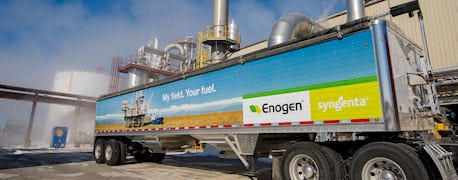April 16, 2015

Syngenta announced in late March that it has signed a commercial agreement with Southwest Iowa Renewable Energy (SIRE) to begin using Enogen corn enzyme technology at its Council Bluffs, Iowa, ethanol production facility following the 2015 harvest. SIRE is the third Iowa plant to sign such an agreement. Plymouth Energy LLC at Merrill and Quad County Corn Processors at Galva accept and pay a premium for corn with the Enogen enzyme trait technology.

IN THE KERNEL: Southwest Iowa Renewable Energy, an ethanol plant at Council Bluffs, will begin using Enogen corn enzyme technology following 2015 corn harvest. This will enable local growers to serve as enzyme suppliers, as the enzyme is in Enogen corn kernels.
According to Jack Bernens, head of Enogen for Syngenta, the robust alpha amylase enzyme found in Enogen grain helps an ethanol plant dramatically reduce the viscosity of its corn mash, and reduce (or may eliminate) the need to add a liquid form of the enzyme. Syngenta is currently contracting with nine ethanol plants to use Enogen corn, three in Iowa and six in other states.
Farmers growing Enogen corn earn a premium of 40 cents
"This breakthrough viscosity reduction can lead to unprecedented levels of solids loading, which directly contributes to increased throughput and yield, as well as critical cost savings from reduced natural gas, energy, water and chemical usage," says Bernens. "Farmers who grow Enogen corn benefit as well; they earn an average premium of 40 cents per bushel.
"The agreement with SIRE will enable SIRE to source alpha amylase directly from local corn growers and keep enzyme dollars in the local community," Bernens adds. "This is what truly sets Enogen corn apart from other technologies designed to enhance ethanol production. It adds significant incremental value at the local level for communities that rely on their ethanol plant's success."
Every decision that you make influences the size and scope for corn yields. From the corn hybrid you select to the seeding rate and row width you choose. Download our FREE report over Maximizing Your Corn Yield.
SIRE is a state-of-the-art dry-mill grain processing facility that annually produces more than 125 million gallons of ethanol and consumes more than 40 million bushels of corn. SIRE sources grain from a large portion of southwest Iowa and several counties in southeast Nebraska.
Local investment is a key benefit of using Enogen grain
According to SIRE general manager and CEO Brian Cahill, the opportunity to invest locally is a key benefit of using Enogen grain. "We look forward to purchasing alpha amylase in the form of high-quality grain directly from local corn growers," says Cahill. "When you think about the value that Enogen will deliver for our growers, our facility and our community, it's a win-win-win scenario."
~~~PAGE_BREAK_HERE~~~
For more information about Enogen corn enzyme technology visit Enogen.net. To inquire about incorporating Enogen into an ethanol plant, contact Tim Tierney, head of Enogen business accounts, at [email protected] or 612-656-8169. For information about Syngenta, visit syngenta-us.com. Join the conversation online, connect at social.SyngentaUS.com.
Quad County Corn Processors hits million-gallon cellulosic milestone
In related news, Syngenta announced April 9 that Quad County Corn Processors has produced its 1 millionth gallon of cellulosic ethanol through the use of Cellerate process technology at its Galva, Iowa, ethanol production facility. This milestone puts QCCP on track to produce 2 million gallons of cellulosic ethanol per year.
The plant already produces 35 million gallons per year through the regular corn grain ethanol production process converting starch in corn kernels to ethanol. Now, by adding the Cellerate process to the facility, the ethanol plant's total annual production will be 37 million gallons per year.
Cellerate can help ethanol plants increase production by converting corn kernel fiber into cellulosic ethanol. In addition to enabling plants to increase production by up to 6%, Cellerate also helps ethanol producers increase protein content of dried distillers grains to as much as 40% and increase total yield of distillers corn oil up to 1.6 pounds per bushel.
Cellerate technology helps QCCP increase ethanol production
"With Cellerate process technology, we are able to extract more ethanol out of the same kernel of corn," says Delayne Johnson, chief executive officer of QCCP. "The combination of Cellerate and Enogen corn enzyme technology allowed us to produce advanced and cellulosic ethanol while decreasing natural gas usage, increasing ethanol throughput and reducing energy consumption. This technology package is very appealing for ethanol plants looking to improve their bottom line."
Every decision that you make influences the size and scope for corn yields. From the corn hybrid you select to the seeding rate and row width you choose. Download our FREE report over Maximizing Your Corn Yield.
In 2014, Syngenta announced an agreement with Cellulosic Ethanol Technologies, a wholly-owned subsidiary of QCCP, to license Cellerate to ethanol plants.
Bolt-on process converts corn kernel fiber into cellulosic ethanol
"Ethanol plants can easily integrate Cellerate process technology into their existing production process," says Jack Bernens, head of marketing for Enogen corn enzyme technology at Syngenta. "In conjunction with Enogen corn enzyme technology, Cellerate is capable of delivering notable benefits to ethanol plants beyond what can be achieved through either technology alone."
QCCP was recently honored with the RFA 2015 Industry Award at the 20th Annual National Ethanol Conference in recognition of its achievements in advancing the use of cellulosic ethanol technology. The RFA Industry Award is bestowed annually to individuals or groups that demonstrate great dedication and innovation within the renewable fuels industry. "QCCP is helping to make cellulosic ethanol a reality," Bernens says. "We are proud to be collaborating with them to make this breakthrough bolt-on process technology available to other ethanol plants."
For Cellerate technical inquiries call Tim Tierney at Syngenta at 612-656-8169 or Travis Brotherson at QCCP at 712-282-4628. For information about Enogen corn enzyme technology visit Enogen.net. For info on Cellerate process technology, visit www.syngenta.com.
You May Also Like




